By Bashkim Trenova
Part thirty-six
Memorie.al publishes the memoirs of the well-known journalist, publicist, translator, researcher, writer, playwright and diplomat, Bashkim Trenova, who after graduating from the Faculty of History and Philology of the State University of Tirana, in 1966 was appointed a journalist at Radio- Tirana in its Foreign Directorate, where he worked until 1975, when he was appointed journalist and head of the foreign editorial office of the newspaper ‘Zeri i Popullit’, a body of the Central Committee of the ALP. In the years 1984-1990, he served as chairman of the Publishing Branch in the General Directorate of State Archives and after the first free elections in Albania, in March 1991, he was appointed to the newspaper ‘Rilindja Demokratike’, initially as deputy / editor-in-chief and then its editor-in-chief, until 1994, when he was appointed to the Ministry of Foreign Affairs with the position of Press Director and spokesperson of that ministry. In 1997, Trenova was appointed Ambassador of Albania to the Kingdom of Belgium and to the Grand Duchy of Luxembourg. Unknown memories of Mr. Trenova, starting from the war period, his childhood, college years, professional career as a journalist and researcher at Radio Tirana, the newspaper ‘Zeri i Popullit’ and the Central State Archive, where he served until the fall of the communist regime of Enver Hoxha, a period of time when he in different circumstances met many of his colleagues, suckers of some of the ‘reactionary families’, etc., whom he described with a rare skill in a book of memoirs published in 2012, entitled ‘Enemies of the people’ and now brings them to the readers of Memorie.al
Continued from the previous issue
“Enemies of the people”
The first anti-communist demonstration on March 26, 1990 in Kavaja and the magnificent rally in Tirana, to condemn the “traitors” of the embassies!
On March 26, 1990, the first mass anti-communist demonstration took place in Albania in Kavaja, a small town in Central Albania. Numerous police forces brutally suppressed the demonstration. For the first time, dictator Hoxha is massively insulted. The demonstration spurred the start of the Nationwide Democratic Movement.
On July 2, 1990, the mass entry of Albanian citizens into the western embassies in Tirana begins. Thousands upon thousands of young people sought political asylum in these embassies risking their lives, but also hoping for a dignified life away from home, away from those who loved more, but also those who hated more. For the dictatorship this was a powerful blow. She organized a “magnificent” rally in the central square of the capital to punish those who had entered foreign embassies as traitors and breadwinners. She intended to show through this rally that she had the support of the people. In fact, the participants in this rally, including me, were forced to be present. In fact, the central square where the rally took place was surrounded by snipers standing on the roofs of buildings, without trying at all to disguise their presence. Indeed among the mass of civilians, the large green spots of soldiers’ squares were clearly visible, which had been brought there not merely to fill the square.
The dictatorship tried to intimidate the people, but now the direction of fear had changed. The people had killed fear, fear was killing dictatorship. After the event, the embassies started anti-communist demonstrations throughout the country, especially in Tirana, Durres, Kavaja, Shkodra, Elbasan and Korca. The main demand of the demonstrators was the opening of Albania and the overthrow of the communist dictatorial regime. At the same time begins what is already known as the biblical exodus of Albanians. Over 20,000 Albanians leave the country hijacking ships that were anchored in Albanian ports.
Student movement on December 8, 1990 in the ‘Student’ City!
On December 8, the students of the University of Tirana joined the popular protest movement. At their head was Azem Hajdari, a student originally from Tropoja, a mountainous province in northeastern Albania. Initially the students submitted some economic requirements. Soon they came up with clear political demands. The key was to allow for political pluralism. Very soon in their rallies the cry was issued: “Down with dictatorship! Down with dictatorship! ” The dictatorship tried to extinguish the Student Movement by force of arms, but it found the support of the people of the capital.
On December 12, 1990, the dictatorship was forced to make concessions. On this date, the Democratic Party of Albania was formed, the first opposition party. At the same time, the regime hastened to call its members and sympathizers “traitors”, “ballists”, etc. This propaganda was extremely anachronistic, not at all clever, but the Labor Party had no real arguments to defend. She had time left in 1944.
On December 14, 1990, the meeting of the basic organization in the State Archive!
On December 14, the State Archives Party organization gathered to discuss the latest developments in the country. According to the orientation given by the highest leadership of the Party, in meetings like this, which were being organized all over the country, the ordinary communists should show solidarity with this leadership, express their loyalty to the Party as well as their devotion to serve it to the end of her ideal! On December 14, 1990, my final split with the Party took place.
At the meeting of the organization I, among other things, said: “I do not agree at all with the use of police violence against our children, our student brothers and sisters, in recent days. I do not agree to shoot with a hammer what represents the future of Albania, its brain, its intellect. I do not agree with such actions even if they are said to be in accordance with the law. The whip over the sons of the people cannot be justified by any law, cannot be accepted by any sound morality, no honest reason, no non-opportunistic logic. Otherwise, today we agree with him, tomorrow why not with bullets, always in the name of the law, i.e. with fratricide in the name of the law…! “Moreover, for me, the students’ demands were quite fair and reasonable.”
I further portrayed the Labor Party, as I thought, saying: “I think that the Labor Party in its current state is old and incapable of following dynamically the contemporary processes, to be their powerful engine. It has a privileged leadership, which has not been interested for decades in the true opinion of its base and the people, which has demanded from them only bureaucratic or servile obedience and solidarity, applause as unbridled as possible, cheering to the point of screaming and pump. This has led to a distancing with serious consequences, an existing social polarization even though it has been denied. This has made me see myself outside of her even though her stated ideals have been and are for me the most ideal. Only a reconstruction with foundations I think can save him. She must sow the seed for a new seedling to produce abundant fruit, to refresh and stay strong. “She needs new people, new opportunities.” It seems to me that I am the first communist to publicly, in the conditions of the time, have thus thrown the opinion that the Labor Party could no longer run the country, and also the first to have publicly thrown the idea of the need for reform on its foundations.
I have developed this opinion even further in the meeting of the organization. In my ongoing discussion, always portraying the Labor Party, I said: “It has for decades kept and still has under its leadership people without authority, or mediocre and backward in psychology. Thus, even if it has had power, the authority of power, it is losing moral power, even more and more rapidly. With these people she did not know how to lead efficiently, she could not lead according to the demands of the time and the needs of our society, the people. It brought the country to the threshold of the state of emergency in the internal economic plan and in complete isolation in the external, political plan…! In addition to poverty, hunger, misery, deep economic backwardness, the Party with its sectarianism and dogmatism practiced, with its extreme politicization and ideology, with its absolute submission to the opinion of a single person, gradually left the people. This is shown by the fact that the people do not want to participate in the meetings of the grassroots organizations, that he opened the doors to those who were beaten and persecuted by law enforcement in July and now most recently in student city events. “And when people open their doors when you are being followed, it means that these doors are closed to those who follow, to those who stand behind them and guide them.”
Ramiz Alia, who did not agree with the establishment of democracy in Albania, in the absence of courage to say this openly, spread at that time the opinion according to which in Albania the conditions for a democratic system had not yet been created, that it took time, the process of gradual democratization of the country had to be accepted, a process that was being led by the Party! In my discussion, I openly opposed the democratization farce of Ramiz Alia. I openly said: “We are prepared for a full and rapid democratization, without wasting time. The party, I think that even here does not make fair assessments, therefore it is reluctant, withdraws today and tomorrow, justifying that the masses, the people, the cadres have not been prepared yet, they have such a level or such. “After these words, I handed over the card of the member of the Albanian Labor Party, being, I believe, the first communist who in the created conditions has made this step. It was not at all certain what the near future would bring. I did as my conscience told me.
On January 5, ’91, the first issue of “Democratic Renaissance was published and in March ’92, I took over as editor-in-chief”!
About three weeks later, on January 5, 1991, the first issue of the newspaper “Rilindja Demokratike” was published, the first opposition newspaper of the dictatorship, a body of the Democratic Party. For more than a year she continued to go out twice a week. In one of its first issues, I published an article entitled: “The Fatal Shadow of the Enemy.” The idea of this writing was that dictatorship has always been followed by the fatal shadow of the enemy, that it incessantly produced enemies that it could not exist without enemies. In one of its first issues, under the title: “Why I left the Albanian Labor Party”, I also published, almost in full, the discussion I had at the meeting of the organization on December 14, 1990.
In February 1991, I left the State Archives and started working for the “Democratic Renaissance”, thus returning to my passion as a journalist. At this time, the well-known historian Gazmend Shpuza was appointed director of the State Archive, after Thoma Murzaku. I parted with him. He expressed regret that I would not be his collaborator, but as he said, he could not stop me from leaving the State Archives. Almost a year later, in March 1992, I took over the management of the newspaper, so I was appointed its editor-in-chief. Before me as editors-in-chief were Frrok Çupi, Napoleon Roshi and Mitro Çela. In March 1992, the Democratic Party won the election and came to power. Mitro Çela during the election campaign, since he had thrown his candidacy for deputy, was busy with meetings with voters. Thus, he was practically removed from the newspaper. During the election campaign, I turned the “Democratic Renaissance” into a daily newspaper. Being in the position of editor-in-chief, one fine day, Mujo Buçpapaj, journalist of “Democratic Renaissance”, brings me for publication an article by Thoma Murzaku. I did not even agree to read Thomas, now a “democrat”!
Some time ago I read in the press that the 20th anniversary of the “Democratic Renaissance” was celebrated. Frrok Çupi and Mitro Çela were also present. Napoleon was dead, so as dead he was not at the occasion celebration. I was not dead, but apparently in Tirana they did not know that I was still alive! An old friend, after reading the names of the participants in the party, called me on the phone and said: “You have been honored not to put your name among the guests.” Apparently my name had entered the enemy lists! Froku and Mitro had been on these lists for a long time. Apparently they were partially or completely rehabilitated!
In fact, being ambassador to Belgium, but also afterwards, I had made some “mistakes”. On one occasion, for example, when we were celebrating November 28, the day of the Declaration of Independence of Albania, representatives of different groups and political currents of the Albanian diaspora in Belgium came to me at the Embassy. Everyone agreed to gather in a hall, in that “Madlena”, in the center of Brussels. Not everyone agreed on the portraits of political figures to be displayed in a conspicuous place of the hall. No group accepted the portrait of that political figure representing another group. In these conditions, to be together on that day that did not belong to either parties or groups, but to all Albanians, I proposed that everyone give up the portraits and be replaced only by the Albanian flag. The bad thing about my proposal was that even the portrait of the president of Albania, at that time, Sali Berisha, would not be exposed. I told this to Berisha myself. After my words, he did not react, so neither approved nor opposed me.
My “mistake”, why was I against the formation of the branch of the Democratic Party in Belgium!
I continued to make “mistakes” even after I was expelled from the embassy. During a visit to Brussels at the time, Sali Berisha spoke to me about the establishment of a branch of the Democratic Party of Albania in Belgium. I did not agree with the creation of political parties in the diaspora. Even without these political parties, the Albanian diaspora was quite divided. The parties would surely act even worse in deepening this rift. I also told this to Berisha. Not long after, the branch of the Democratic Party of Albania was established in Brussels. I learned this by chance. At the top of it were also drug traffickers who, as they openly boasted, had more than once received and escorted Berisha in Belgium and abroad, all the way to Strasbourg. During his occasional trips to Brussels, Berisha never asked to meet with me again. I understand.
Over time, I have delved deeper into “mistakes”. On the occasion of the 20th anniversary of the creation of the radio “Jehona e Shqipes” in Brussels, I participated in the preparation of a number of shows. Considering “Jehona e Shqipes” as an independent radio, I tried to create a balance in the choice of news. I sometimes even made some brief comments. I did this, for example, after we broadcast the news about a meeting of Prime Minister Berisha with the Greek Prime Minister. “How could I go to Greece and not meet my friend,” Berisha had said, referring to the Greek prime minister. This meeting lasted no more than ten minutes, but Berisha stated at the end, that he and his friend had discussed together ten or more problems of the most important in the Albanian-Greek relations. He also specified the problems they had discussed.
This seemed unbelievable to me, at least careless by the press office of the Prime Minister who had formulated the news, so after I finished reading I added: “Is it possible to examine all these problems in ten minutes”?! After this question, the bell rang in the studio of “Jehona e Shqipes” and someone, who was doing Berisha’s bodyguard when he came to Brussels, nervously asked the host of the show: “What does Bashkimi say like that”?! The same would be said in one case: “Berisha said that the Union has betrayed.” I do not know if Berisha said such a thing. I know that Berisha used to send me a greeting card for the New Year. After occasional “mistakes”, I was removed from Berisha’s wish list. The postcards were also cut. I should have realized myself that I was included in other lists. Once, when I was the editor-in-chief of “Democratic Renaissance”, in the presidential villa in the hills of the Lake, Berisha had told me that he had many ministers, but only two or three friends. I did not know I was one of them! Times change, people change, lists change.
In 1995 Berisha published the book “Contract of the Democratic Party with Albania”. A copy of it with the author’s dedication, I also have in my library. On this occasion, Sali Berisha wrote: “To Mr. Bashkim Trenova, for his valuable contribution and the cooperation we have”. Many years have passed since then. There can be no talk of cooperation. For the “precious contribution”, one cannot be asked to speak of “forgetfulness”! In communism, he lost his head even being a “People’s Hero”. However, there is a big difference with today’s democracy. “Oblivion” does not kill; sometimes it is even for the better.
INSTEAD OF CLOSURE
Communism, wherever it came to power, became synonymous with crime, infidelity, hunger and backwardness, oppression and hypocrisy, deception and hatred, eavesdropping and persecution, exile and handcuffs, condemned speech and thought, the disruption of society and family, the denigration of personality, of isolation and bitter, hopeless loneliness ….!
During the communist dictatorship in Albania, many more people were killed, imprisoned, interned than during the Second World War, so in terms of barbarism, the communist occupation did not have to feel inferior to Nazism. According to the data published in the Albanian press, during the communist dictatorship in Albania, 5,577 men and 450 women were shot, with or without trial, as “enemies of the people and the Party”, and were imprisoned as “enemies of the people and the Party”. 26,768 persons, of whom 7,367 are women. 998 men and 45 women died in the political prisons of the dictatorship. It is estimated at 308 the number of men and women who have gone mad from the torture in these prisons or in the investigator. The dictatorship interned 50,000 Albanian families, men, and women, children, young and old. Many of them, more precisely, 7,022 people died “as enemies of the people and the Party”, in the swamp camps, an Albanian version of Stalin’s Siberian gulags. The figures may seem “modest” in relation to Stalin’s crimes in the Soviet Union, but it should not be forgotten that Albania had a population 150-200 times smaller than the Soviet country and that the figures do not reflect the whole truth.
It has been 20 years since the fall of the dictatorship. I have read on several occasions in the Albanian press that different opinions appear on the Cemetery of the Martyrs of the Nation. Until now, there are martyrs of the Anti-Fascist National Liberation War, ie fighters of the former brigades and other partisan military units, which are led by the Communist Party. Now, as far as I understand, it is required that next to them, or in a separate plot, the remains of the nationalists who gave their lives fighting against the Nazi-fascist forces be laid to rest. This coexistence of the dead in a democracy does not seem to be possible without difficulty. Nevertheless, it seems to me that coexistence between the livings is even more difficult.
In Albania, unfortunately, the recent past is still present. Communists converted to socialists and democrats, enslaved to Marxist-Leninist mentalities, dogmas and practices, continue to destroy, crush the “enemy of the people”, who is always on the other side of the political barricade. The camps of political party militants are screaming just like Labor Party fanatics once did. Does it continue like this for inertia, for political ignorance? I do not believe. It seems to me that we still have a long way to go, a lot of “battles” with ourselves to get rid of the communist ghost “enemies of the people” ./Memorie.al
The next issue follows




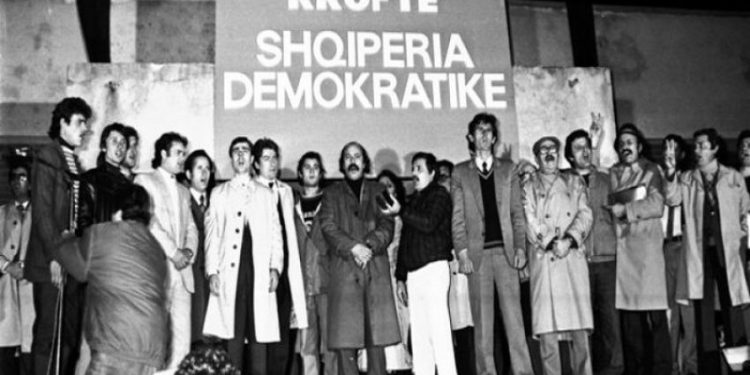
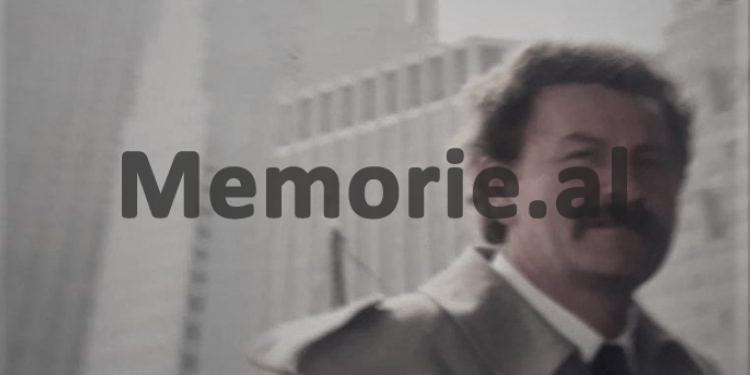
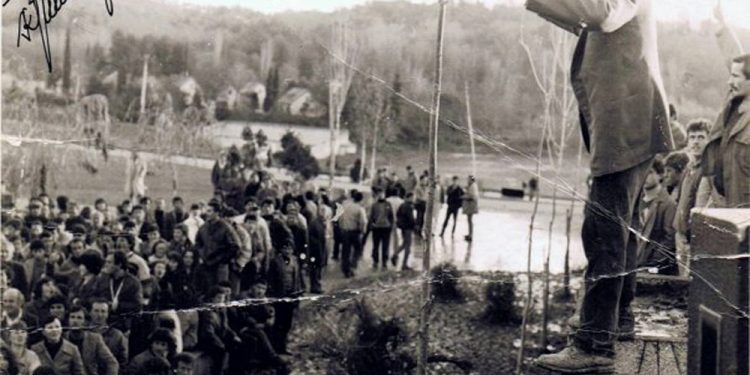
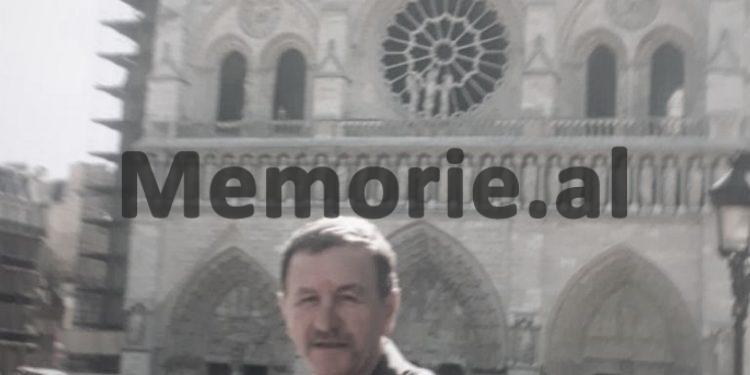
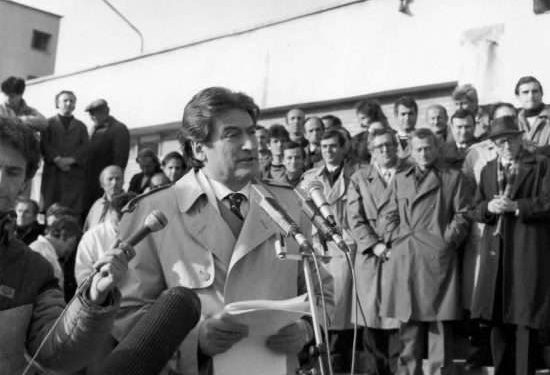
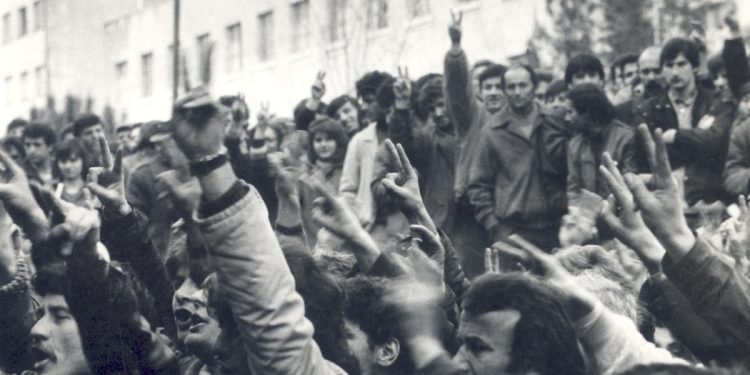
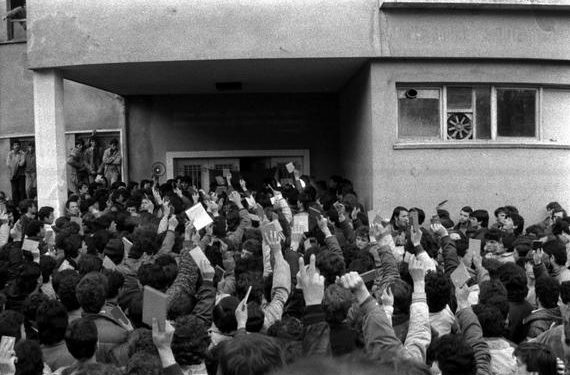


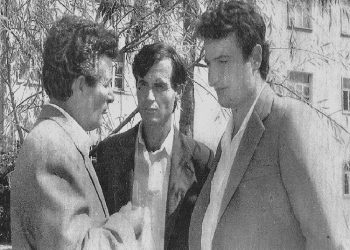

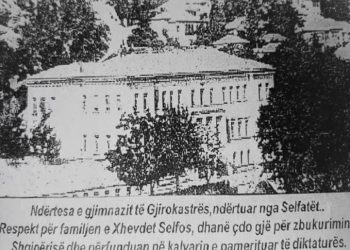
![“When the camp commander, in the presence of the group accompanying him, said to the convicted journalist: ‘Why did you exchange this beautiful profession for the Spaç wagon [mine cart/labor], he [the journalist]…”/ The unknown story of January 10, 1983](https://memorie.al/wp-content/uploads/2025/10/Spaç_Prison_Mirditë_Albania_–_Buildings_2018_08-350x250.jpg)
